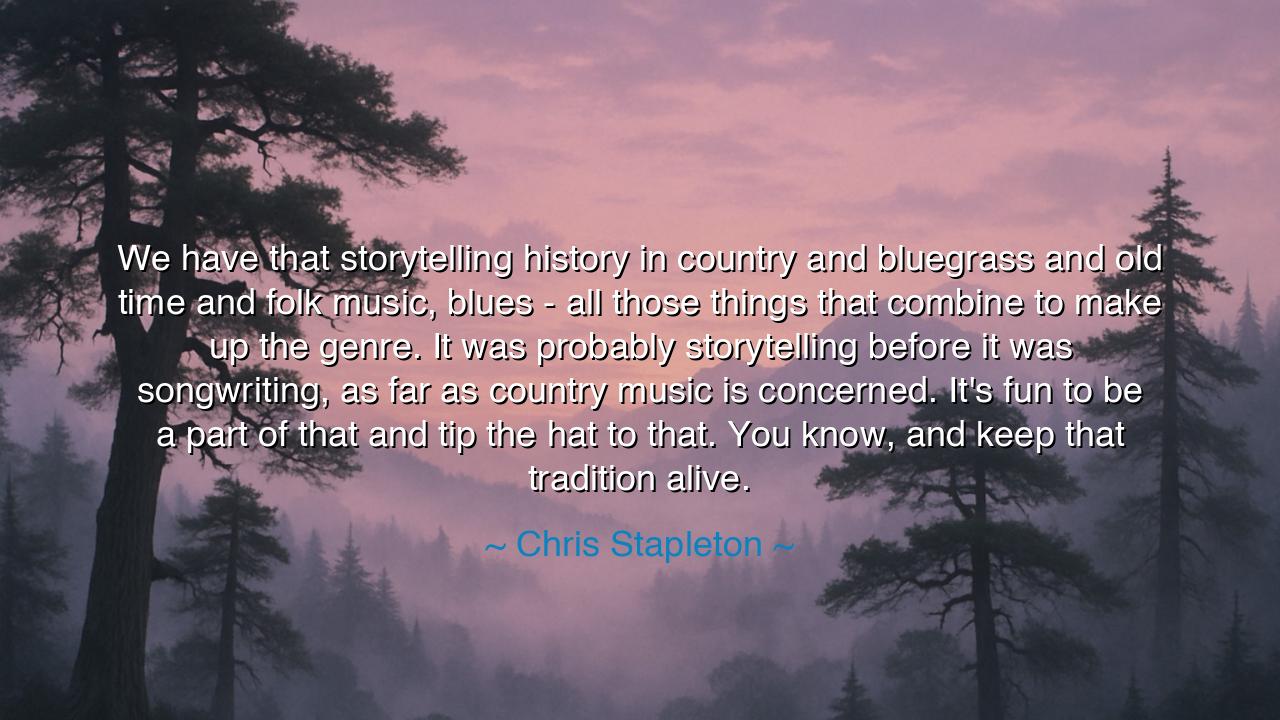
We have that storytelling history in country and bluegrass and
We have that storytelling history in country and bluegrass and old time and folk music, blues - all those things that combine to make up the genre. It was probably storytelling before it was songwriting, as far as country music is concerned. It's fun to be a part of that and tip the hat to that. You know, and keep that tradition alive.






Hearken, O children of song and seekers of story, and attend the words of Chris Stapleton, who spoke with the reverence of one who walks in the footsteps of giants: “We have that storytelling history in country and bluegrass and old time and folk music, blues - all those things that combine to make up the genre. It was probably storytelling before it was songwriting, as far as country music is concerned. It's fun to be a part of that and tip the hat to that. You know, and keep that tradition alive.” In these words lies a meditation upon tradition, memory, and the sacred art of carrying the tales of the past into the present through melody and voice.
Stapleton reminds us that music, especially the genres of country, bluegrass, and blues, is more than entertainment—it is the living chronicle of human experience. These songs are repositories of joy, sorrow, triumph, and toil, carrying the stories of generations before us. Long before notes were penned and lyrics codified, storytellers recounted lives, struggles, and victories, and these narratives became woven into the music that defines cultural memory. To perform in this tradition is to honor the past, to give life to the voices that echo through time.
Consider the early bluesmen of the Mississippi Delta, whose songs told of hardship, resilience, and longing. Figures like Robert Johnson and Lead Belly transformed personal and communal struggles into music that resonated far beyond their own lifetimes. They were not simply composers; they were chroniclers, historians of the human heart. Stapleton’s reflection underscores that storytelling is the foundation of these genres, and that every modern performer is entrusted with the continuation of a sacred lineage.
Country and bluegrass similarly preserve history. The ballads of the Appalachian Mountains recount the lives of farmers, miners, and pioneers, capturing the rhythms of daily toil and the echoes of triumphs and losses. These songs are not merely melodies but records of lived experience, passed from generation to generation. Stapleton, by participating in these traditions, acknowledges his role as both performer and custodian, carrying forward the collective memory of a people.
The essence of this quote is also a call to gratitude and humility. To “tip the hat” to the tradition is to recognize that artistry is inseparable from history. Musicians build upon the foundations laid by those before them, respecting the stories, struggles, and innovations of their predecessors. Each note and lyric is enriched by the weight of that heritage, and each performance becomes a dialogue between past and present.
From this reflection emerges practical wisdom: to preserve any art or tradition, one must first understand its roots. Study the music, listen to the voices of the past, and honor the context from which it arose. In doing so, one ensures that the tradition remains alive, vibrant, and meaningful for future generations. Storytelling, when preserved through music, is immortality for human experience.
The lesson extends beyond music itself. In all fields of endeavor, there is wisdom in carrying forward the knowledge, insights, and narratives of those who came before. History, like a song, must be felt, internalized, and expressed. To engage with it actively is to contribute to a living continuum, where the past informs the present and inspires the future. Stapleton’s words remind us that the vitality of culture depends upon those willing to honor it with both reverence and creativity.
Thus, remember: music is history made audible, a bridge between generations, and a vessel for human memory. Chris Stapleton teaches that by participating in storytelling traditions, by tipping the hat to the past, we keep alive the voices, lessons, and souls of those who preceded us. Engage with your heritage, celebrate its stories, and ensure that its melodies echo across the ages. To perform history is to honor it, and to preserve it is to give it life anew.
If you wish, I can also craft a more dramatic, audio-ready version, vividly illustrating the journey from Delta blues to modern country, weaving in Robert Johnson, Lead Belly, and Appalachian ballads, to make Stapleton’s message emotionally and culturally compelling for listeners. Do you want me to do that next?






AAdministratorAdministrator
Welcome, honored guests. Please leave a comment, we will respond soon